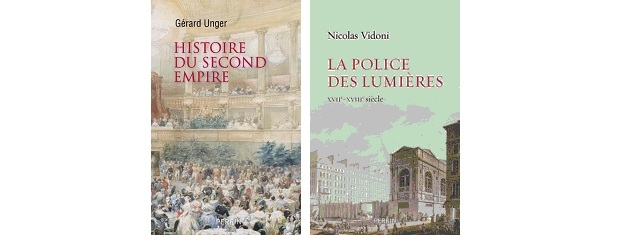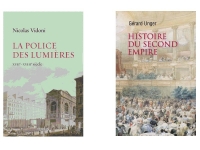Arts
Two French Books About THE FRENCH SECOND EMPIRE & THE POLICE OF ENLIGHTENERS
Published by Perrin Editions

(Source: Perrin Editions)
USPA NEWS -
- "HISTOIRE DU SECOND EMPIRE" (History Of The (French) Second Empire" by Gérard UNGER and Published in FRANCE by Perrin Editions. Before this Book, the Author has already published "Lamartine, poète et Homme d'Etat", 'Aristide Briand, le Ferme Conciliateur" and "Gaston Deferre". French Second Empire Period has Bad Press, born from a Coup d'Etat, it ended up at the Military Debacle of SEDAN.
- "HISTOIRE DU SECOND EMPIRE" (History Of The (French) Second Empire" by Gérard UNGER and Published in FRANCE by Perrin Editions. Before this Book, the Author has already published "Lamartine, poète et Homme d'Etat", 'Aristide Briand, le Ferme Conciliateur" and "Gaston Deferre". French Second Empire Period has Bad Press, born from a Coup d'Etat, it ended up at the Military Debacle of SEDAN.
Napoleon III´s Reign was a Period of Great Modernity and Change in France and in Europe. With the Increasing Industrialization of France came Greater Interest in the Life of the “Worker“, and Europe saw the Birth of the Nations of Italy and of Germany. Louis-Napoleon Bonaparte was born in Paris on 20 April 1808. His father, Louis Bonaparte, was the Brother of Napoleon I and his Mother, Hortense de Beauharnais, was Napoleon´s Step-Daughter by his First Marriage to Josephine. Louis-Napoleon grew up with a Strong Sense of Respect for his Family History and Origins and quickly became interested in Politics, seeking to restore the Bonaparte Dynasty to Power.
Napoleon III´s Reign was a Period of Great Modernity and Change in France and in Europe. With the Increasing Industrialization of France came Greater Interest in the Life of the “Worker“, and Europe saw the Birth of the Nations of Italy and of Germany. Louis-Napoleon Bonaparte was born in Paris on 20 April 1808. His father, Louis Bonaparte, was the Brother of Napoleon I and his Mother, Hortense de Beauharnais, was Napoleon´s Step-Daughter by his First Marriage to Josephine. Louis-Napoleon grew up with a Strong Sense of Respect for his Family History and Origins and quickly became interested in Politics, seeking to restore the Bonaparte Dynasty to Power.
When the Frail Young Son of Napoleon I, Heir to the Imperial Throne, died on 22 July 1832, his Cousin Louis-Napoleon became the Guardian of the Empire´s Legacy. On 30 October 1836, he began to stir up Opposition to the Regime with a First March on Paris from the City of Strasbourg. This First “Coup d´Etat“ was very quickly thwarted, King Louis-Philippe then sent Louis-Napoleon into Exile in the United States. Later, Louis-Napoleon continued his Political Activities from London where he prepared a new Coup d´Etat. From the 4th to the 5th of August, 1840. The Attempt again ended in Failure. The Conditions of his Imprisonment were rather Agreeable: Louis-Napoleon lived in an Apartment within the Fortress during Six Years before he escaped. In 1848, there was Revolution in France again. Following the Abdication of the king, Louis-Philippe, a Republic (the Second French Republic) was proclaimed. It is in this Context that Louis-Napoleon, supported by the Parti de l´Ordre, was elected President on 10 December, taking up Residence in the Palais de l´Elysée, the New Seat of Republican Power.
Having become President of the Republic, Louis-Napoleon Bonaparte allowed the Conservatives in the Legislative Assemblée to conduct Reactionary Policies (Suppression of Universal Suffrage, Curtailment of Press Freedoms). Faced with these Unpopular Measures, the Prince-President gradually presented Himself as the Champion of Universal Suffrage and the Protector of the Common Worker and of Religion. Louis-Napoleon dissolved the Assemblée Nationale on 2 December 1851, in Direct Violation of the Constitution. On 21 December, the Corps Electoral was asked to endorse the New Governmental Principles : Executive Power would be accorded to an Elected President who would rule for Ten Years. The Plebiscite was largely in favour : 7,481,231 voted for while 640,292 voted against. A New Plebiscite on 21 November preceded the Regime Change : on 2 December 1852, the Second Empire was established. The Prince-President Louis-Napoleon Bonaparte officially became Napoleon III, Emperor of the French....
- LA POLICE DES LUMIERES" (The Police during The Lumière (Enlighteners) Period), by Nicolas Vidoni and Published in FRANCE by Perrin Editions. The Author's works are mostly on French Police History and the Urban Political History. He is Lecturer at Université Paul Valéry-Montpellier 3. The Lumières / Enlighteners was a Cultural, Philosophical, Literary and Intellectual Movement of the Second Half of the 18th Century, originating in France and spreading throughout Europe. It included Philosophers such as Baruch Spinoza, John Locke, Pierre Bayle and Isaac Newton. Over Time it came to mean the Siècle des Lumières (Age of Enlightenment). Members of the movement saw themselves as a progressive élite, and battled against religious and political persecution, fighting against what they saw as the irrationality, arbitrariness, obscurantism and superstition of the previous centuries. They redefined the Study of Knowledge to fit the Ethics and Aesthetics of their Time. Their Works had Great Influence at the End of the 18th Century, in the American Declaration of Independence and the French Revolution.
During the 18th Century, the Various Authorities in charge of the Police in the French Kingdom developed and acquired New Writing-Based Instruments of Identification, which were put to use in order to control Society and maintain Order. These Transformations, which affected a Number of Institutions, from the Army to the City Corps, as well as Local Police such as the Maréchaussée. The Author for this Book offers an Essay on the Birth and Development of "Police Policies" practiced by Agents in Paris between 1667 and 1789.
Paris in the 17th Century was the Largest City in Europe, with a Population of Half a Million, matched in Size only by London. It was ruled in turn by Three Monarchs ; Henry IV, Louis XIII, and Louis XIV, and saw the Building of some of the City's most famous Parks and Monuments, including the Pont Neuf, the Palais Royal, the newly joined Louvre and Tuileries Palace, the Place des Vosges, and the Luxembourg Garden. It was also a flourishing Center of French Science and the Arts ; it saw the Founding of the Paris Observatory, the French Academy of Sciences and the First Botanical Garden in Paris, which also became the First Park in Paris open to the Public. The First Permanent Theater opened, the Comédie-Française was founded, and the First French Opera and French Ballets had their Premieres. Paris became the Home of the New Royal Academy of Painting and Sculpture, and of some of France's most famous Writers, including Pierre Corneille, Jean Racine, La Fontaine and Moliere. Urban Innovations for the City included the First Street Lighting, the First Public Transport, the First Building Code, and the First New Aqueduct since Roman Times.
Paris in the 18th Century was the Second-Largest City in Europe, after London, with a Population of about 600,000 Persons. The Century saw the Construction of Place Vendôme, the Place de la Concorde, the Champs-Élysées, the Church of Les Invalides, and the Panthéon, and the Founding of the Louvre Museum. Paris witnessed the End of the Reign of Louis XIV, was the Center Stage of the Enlightenment and the French Revolution, saw the First Manned Flight, and was the Birthplace of High Fashion and the Modern Restaurant. The administration of the city was complicated and deliberately divided, designed to keep the city tightly under royal authority. The position of Lieutenant-General of Police of Paris was created in 1667, and given to Gabriel Nicolas de la Reynie, the First Police Chief of the City, and he became a Sort of Vice-Minister. All of the Officials were responsible for some Part of the City's Business, but all important Decisions had to be made by the King and his Council.
Despite the Grandeur of the New Monuments, the Center of the City at the Beginning of the 18th Century was Overcrowded, Dark, Unhealthy, andhad Little Light, Air, or Drinking Water. It was also Dangerous, despite the Addition of the First Metal Lanterns on the Main Streets and the Enlargement of the Police Night Watch to Four Hundred Men. At the Beginning of the 18th Century, Security was provided by Two Different Corps of Police ; the Garde de Paris and the Guet Royal, or Royal Watchmen. Both Organizations were under the Command of the Lieutenant General of Police. The Parisians considered the Police both Corrupt and Inefficient, and Relations between the People and the Police were increasingly strained.
Ruby BIRD
http://www.portfolio.uspa24.com/
Yasmina BEDDOU
http://www.yasmina-beddou.uspa24.com/
Ruby BIRD
http://www.portfolio.uspa24.com/
Yasmina BEDDOU
http://www.yasmina-beddou.uspa24.com/
Ruby Bird Yasmina Beddou Enlightenment Enlighteners The Lumieres The Police Of Enlighteners History Of The Second Empire Perrin Editions Gerard Unger Nicolas Vidoni
Liability for this article lies with the author, who also holds the copyright. Editorial content from USPA may be quoted on other websites as long as the quote comprises no more than 5% of the entire text, is marked as such and the source is named (via hyperlink).






